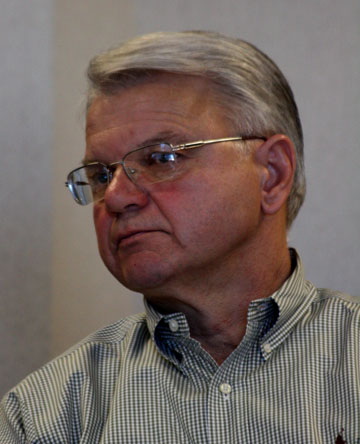 Bill Rakocy, founder of Emerging Energies, is named in the lawsuitFOREST RESIDENTS FILE SUIT AGAINST TOWN OFFICIALS
Bill Rakocy, founder of Emerging Energies, is named in the lawsuitFOREST RESIDENTS FILE SUIT AGAINST TOWN OFFICIALS
SOURCE: New Richmond News, www.newrichmond-news.com
February 17, 2011
By Kevin Murphy,
Three Town of Forest Board supervisors subject to a recall election are defendants in a federal lawsuit alleging their secret agreement of a wind farm developer violated some property owners’ constitutional rights.
According to the suit filed Feb. 9 in Madison:
A group of town residents calling themselves “Forest Voice” alleged board supervisors Roger Swanepoel, Douglas Karau and Carl Cress approved an agreement with Emerging Energies of Wisconsin in April 2008 without notifying affected property owners or holding a public hearing.
In the plan, not announced publically until Aug. 12, 2010, EE sought town approval to construct 39 wind towers of up to 500 feet tall. According to “Forest Voice,” EE’s turbines would create noise and “shadow flicker” up to one-half mile away when operating, diminishing the value of use of the affected properties.
Swanepoel, Karau and Cress also had a conflict of interest in representing the town because each of them or a family member could obtain annual financial payments from EE because they would host or were considering hosting a wind turbine on their property, the lawsuit alleges.
Calls to Swanepoel’s and Karau’s residences Monday seeking comment on the allegations weren’t returned before deadline. Cress said he had no comment Monday on the suit’s allegations.
The agreement approved in April 2008 with EE was reached through a “walking quorum” of phone calls, e-mails and personal conversations in apparent violation of state open meeting laws, the lawsuit claims. The agreement grants annual payments to property owners including Swanepoel, Karau and Cress, living within one-half mile of a wind turbine.
While the agreement creates a “financially favored” class of persons within the town who would benefit from annual payments, it also creates a “financially disfavored” class in terms of safety, quality of life, use of property and property values, the lawsuit claims. Those residents would all be adversely affected by EE’s proposed wind energy project, “Forest Voice” members claim.
Alleged “financially disfavored” residents include:
• Property owners not selected by EE to host a wind turbine but living within one-half mile of one owned by another individual:
• Persons living more than one-half mile from a proposed wind turbine location:
• Persons owning non-occupied residents within one-half mile of a turbine:
• Those living within one-half mile of a turbine who opposed the wind energy project.
“Forest Voice” members including Judi Beestman, Bill Dyer, Jeff Erickson, Scott Voeltz and Brenda and Robert Salseg, are town residents opposed to the EE project on safety and quality of life issues. The board failed to tell the Salsegs about the proposed agreement when approving the Salseg’s request for a trailer home on property within one-quarter mile of a proposed turbine.
The “Forest Voice” residents aren’t eligible for annual payments under the agreement because either the property they own isn’t within one-half mile of a proposed turbine or their property is within a half-mile of a turbine on land owned by someone else.
This “differential selective treatment” of residents in the 2008 agreement is not only “patently arbitrary and irrationally discriminatory, with no rational relationship to any legitimate governmental purpose,” according to the suit, it’s also designed to financially reward participating property owners including Swanepoel, Cress and Karau or their families.
By 2010, the town’s attorney became concerned about the conflict of interest Cress and Swanepoel created by signing the agreement, especially Swanepoel, according to the suit. To disguise and remedy Swanepoel’s conflict, the suit alleges, attorneys for the town and EE and EE co-founder, William Rakocy, devised an illegal “walking quorum” which violated open meeting laws but where the town board would adopt a new agreement without Swanepoel voting.
The 2010 agreement was also developed though secret negotiations between board members and EE and approved without holding a public hearing, “Forest Voice” alleges.
The agreement creates annual payments of $4,000 per megawatt, up to 50 megawatts, to be divided equally among the town, St. Croix County and each property owner of an occupied residence within one-half mile of turbine on their property.
Calls to the attorney for Forest Voice wasn’t returned before deadline.
Attempts to contact Rakocy on Monday weren’t succesful.
The suit claims the board’s approving the 2008 and 2010 agreements without holding a public hearing and completed for their financial reward violated the due process and equal protection rights of the members of “Forest Voice.”
The suit seeks unspecified damages from the town, the three board members and EE.
The suit also seeks a permanent injuction against constructing the EE wind energy project.